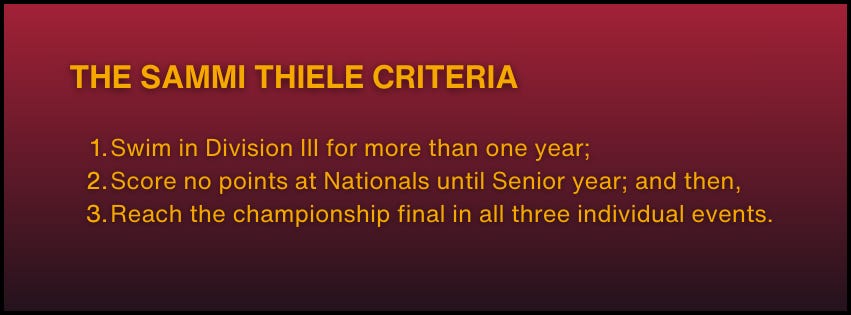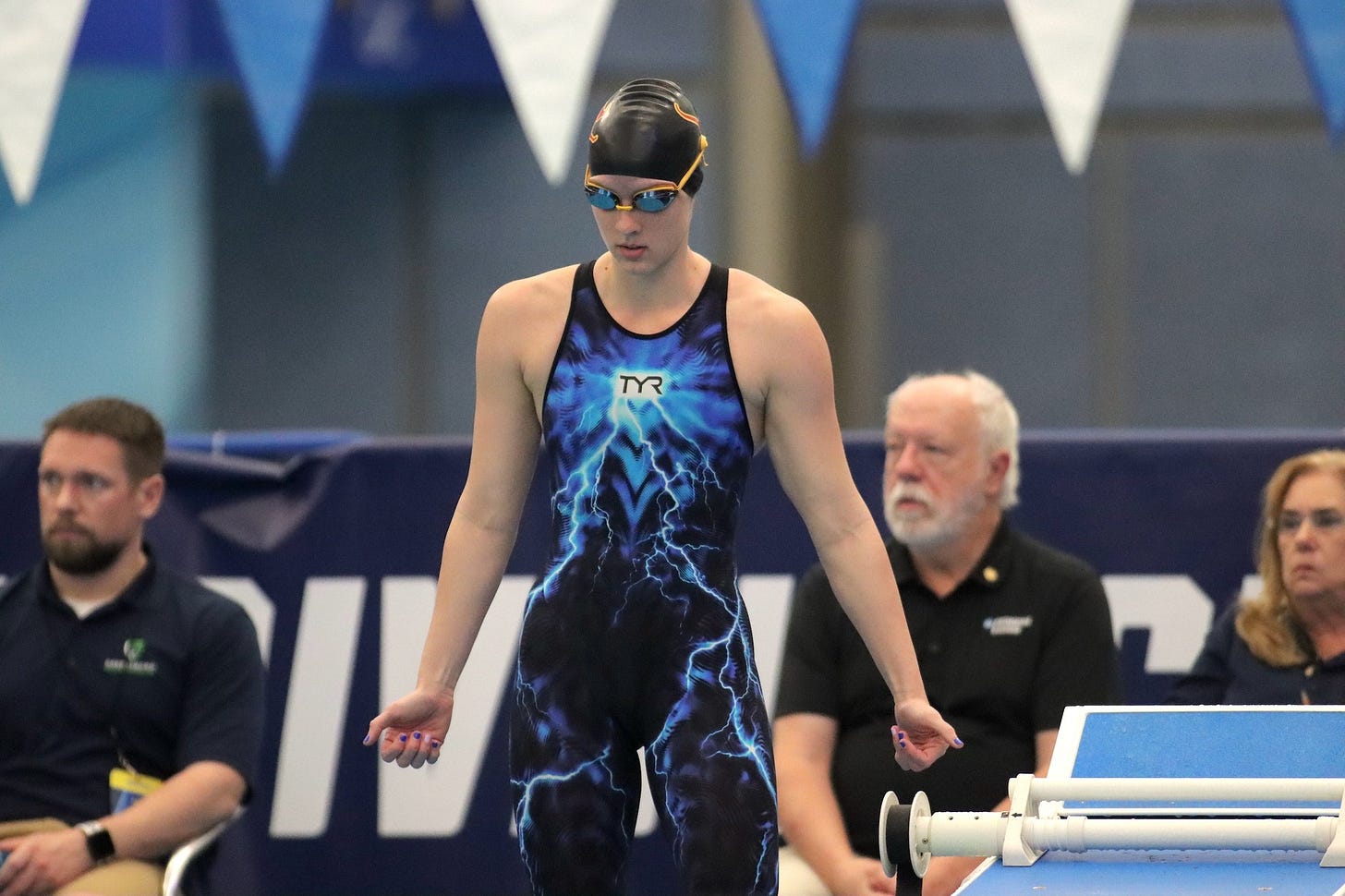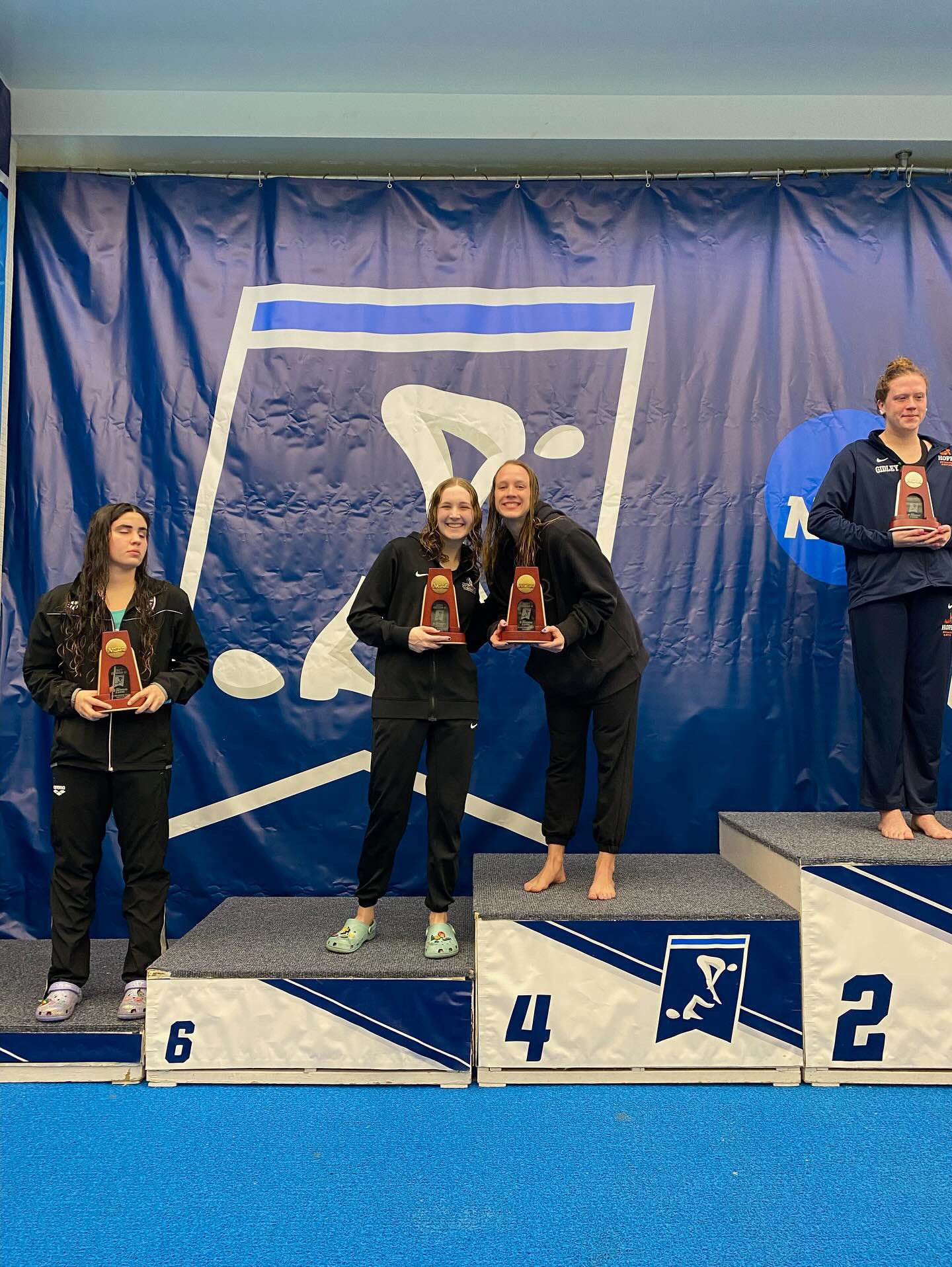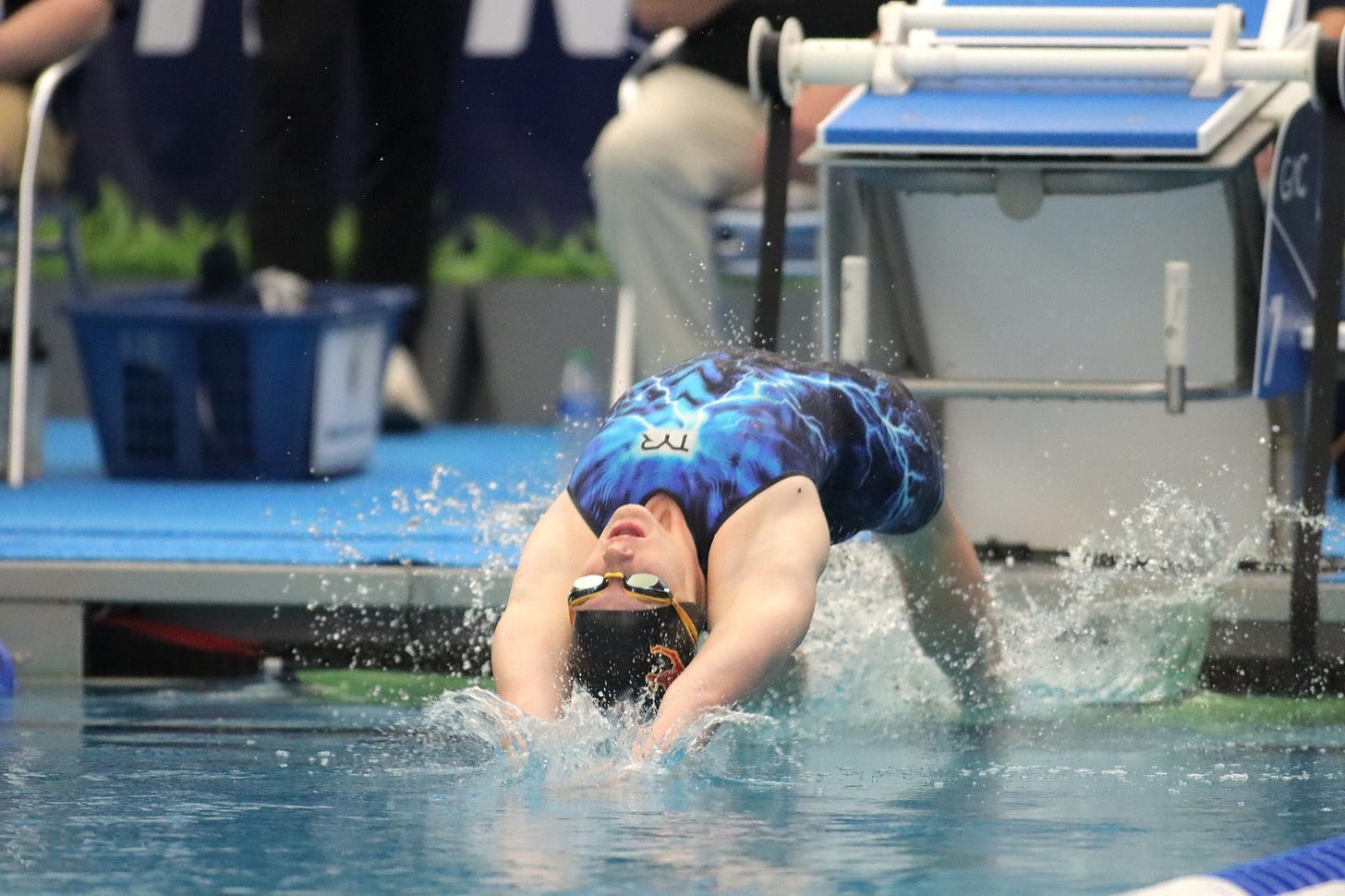A Way to Get Real Gone
How Sammi Thiele Preserved Her Love of Swimming, Steered Clear of Rigid Goals and Expectations, and Made History Along the Way.
We were working on this profile when we received the heartbreaking news that Sammi's coach, Dan Snow, passed away unexpectedly. This tragic loss has deeply affected the Austin College community and everyone who knew Coach Snow. Sammi shared a few heartfelt words about the coach who meant so much to her, which you can read here.
Not a thing that happens
Sammi Thiele was an unlikely candidate to make history at Nationals
She hailed from Austin College, north of Dallas, a small school where - in the category of water based athletics - swim/dive is a distant second to water polo. She was the only athlete from Austin invited to compete at the 2024 NCAA Division III Swim/Dive Nationals in Greensboro. And though she had been invited to Nationals the previous year as well, in 2023 she finished out of the points in the one event she swam.1
In retrospect, there were signs that something might be different with Sammi Thiele this season. First, her name wasn't on the Austin Water Polo roster for the first time in her college career, so swimming was receiving her full attention. Second, on New Year’s Eve she was third in the Division in 100 Back.
By the SCAC championships, it was harder to miss the signs. Sammi Thiele won the 100 Back and 200 Back and was second to only Trinity's Neely Burns in the 200 IM. Invites in three individual events at 2024 Nationals soon followed.
But even with all that, it would have been silly to predict that Sammi Thiele would do what she ultimately did. Because no one, in the history of Women's Division III Swimming, had ever done it.
Sammi Thiele is the first athlete in the history of Division III Women’s swimming to do the following.
This might seem like cherry-picked criteria, but there's a deeper point here. The athletes who do very well at Nationals tend to be precisely who you expect. Among competitors in Women's events at 2024 Nationals, here are the other athletes who reached the championship finals in all three of their individual events.
This is what it looks like most years: a list of the most successful, experienced swimmers in Division III plus a couple of outstanding First-Year performers.
People who swim in Division III for years without ever scoring a point at Nationals don't just show up to Nationals in their Senior year and reach the championship final in all of their events.2 That is not a thing that happens. Ever.3
So, where did Sammi Thiele come from?
'I Wanted to Love My Sport': A Sammi Thiele Origin Story
We reached Sammi Thiele by phone as she returned from visiting her grandfather. Halfway through our chat, it became clear we were speaking with her entire family in the car. Despite our limited interview skills and having never met them, the Thiele family was welcoming and engaging. Though they disagreed with each other on a few points, they united around one important message, forming a sort of Sammi Thiele origin story.
As a seven-year-old, Sammi Thiele swam at a rec pool in her hometown of Keller, Texas. Seeing the divers, she decided to try it herself and quickly became a phenom. According to her dad, as an eight-year-old, she competed at a national meet at the University of Tennessee, 'doing handstands on the five-meter.' Yes, she was eight, but he acknowledged what any parent would think about Sammi Thiele's future—eventually, pick your school, full ride, just keep diving. Until one Friday, Sammi Thiele came home from school and locked herself in the bathroom. As the time to leave for dive practice neared, her father had to convince a crying Sammi Thiele to let him in so they could talk. She expressed fear and felt that the diving program was pushing her beyond what she wanted.
So Sammi Thiele's parents did something remarkable. They said, 'OK, you can just stop diving.' No bargaining, no guilt trip, no reminders of the sunk costs, no attempts to persuade a distraught eight-year-old that she doesn’t know what she really wants. Just a promise from her folks: 'We are never going to make you do anything. It all has to be attraction rather than promotion.'
That message seems to have sunk into Sammi Thiele's bones. And it influenced her decision-making.
‘I think I owe a lot of that [continued love of swimming] to the fact that I never swam club. I only did summer and high school swim. In the club I would have joined, I watched a ton of people burn-out. A ton of people just grow to hate it and grow to be miserable every day of practice. They attributed a lot of it to the pressure and the expectations of the competition. I strictly avoided it because I did not want to have that experience.’
‘I wanted to love my sport. I didn't care if it was the price to pay for not becoming a national champion...I wanted to love my sport.’
'Something that would be great to accomplish along the way'
We asked Sammi Thiele what advice she would give a swimmer entering their senior year, aiming to achieve new milestones.
‘Don't do it because you have certain expectations set by yourself or by other people, especially by other people. Or because you have some goal that takes over your year, trying to reach it. Because if you don't get there, then you're going to be very disappointed about ending your career.’
Tragic heroes
Sammi Thiele is an English major, so she would have had a lot of exposure to the lore of tragic heroes. These characters are so compelling perhaps because we see their analogs in real life: those defined by their relentless pursuit of a single goal at the expense of everything else, blocking-out new information (from the environment and their instincts), and rejecting the mounting evidence that it might be best to reconsider their priorities.
In this ‘protracted tantrum,’ what tragic figures (either fictional or real) tend to overlook is perhaps the most intriguing possibility: that we might actually accomplish more and make more progress by focusing less on striving, planning, and goal-seeking, and by instead allowing ourselves to flow towards the activities and people that bring us happiness in the current moment.4
The orthodoxy of specific and challenging goals
To some, that sounds overly lenient and soft-headed. It is dogma among self-help gurus and management consultants, based on an uncritical reading of experimental academic research, that only specific and challenging goals lead to higher performance and better outcomes. In this view, goals need to be precisely identified and objectively measurable. They also need to be challenging, aimed at distant and difficult-to-reach objectives, requiring a detailed plan outlining the relevant steps.5
Always implied, and often explicitly stated, is the notion that a general and subjective goal to 'work hard and do my best' is not a goal at all: it is a cop-out, a dream, a prelude to failure.6
‘Systematic harm caused by goal setting has been largely ignored’
Yet, a large body of research suggests that—outside the laboratory conditions where most work on specific, challenging goals has been conducted—objectively measurable, precise, and challenging goals often don’t work and can actually cause great harm.7 And it is interesting to note how many successful people (athletes especially) embrace the opposite, the ‘work hard and do my best’ ethos.
If you are interested in this sort of thing, a good place to start is the readable survey article titled 'Goals Gone Wild: The Systematic Side Effects of Over-Prescribing Goal Setting' (Harvard Business School Working Paper 09-083). The authors' general point is 'that the beneficial effects of goal setting have been overstated and that systematic harm caused by goal setting has been largely ignored.'
Sammi Thiele may not be familiar with this body of research, and we can’t say that she would agree with everything written here, but she seems to have reached more or less adjacent views on her own.
So, yes, Sammi Thiele wanted to go to Nationals and reach the championship final in her events, but only 'as something that would be great to accomplish along the way.'
Along the way to what? Along the way to being completely present for her last year as a varsity swimmer, testing her limits, and fully enjoying the time with her teammates, her family, and all those who supported her over the years.
‘The only expectations I had’
Here is our accounting of the (general and subjective) goals that guided Sammi Thiele’s Senior season. She did not suggest these categories but we feel that her comments fit rather comfortably under these headings.
At Nationals, one inescapable issue for Sammi Thiele was that she is not someone who craves pre-race isolation: ‘I do my best whenever I'm goofing off and laughing with my teammates right before, and then I'm like, oh, it’s time for me to go race! Just having my head completely clear and just focusing on having fun is when I race my best’.
She stayed loose by speaking with her friends on Trinity and she was also grateful for her interactions with Sophia Verkleeren of Williams, the 2023 CSCAA Swimmer of the Year, who Sammi said was 'very, very sweet and very, very happy.'
‘At meets, I try to stay as much in the moment as possible and, you know, ...yeah, I'm going to work really hard, I'm going to try to go fast, but also, like, I'm here to have fun and I'm here to do my best.' - Sophia Verkleeren
Last month, we spoke with Sophia Verkleeren (who, coincidentally, also spoke to us from her car). She said a number of things that just as easily could have come from Sammi Thiele. Sophia Verkleeren sometimes finds general goals useful to motivate herself during hard practices 'but when I'm at meets, I really try not to think about them. At meets, I try to stay as much in the moment as possible and, you know, ...yeah, I'm going to work really hard, I'm going to try to go fast, but also, like, I'm here to have fun and I'm here to do my best.'
Transition
Sammi Thiele has a year of eligibility left, but she won’t use it. She says she is ready for the next stage of her life. It won’t take her far from the pool. Sammi Thiele is graduating with a bachelor’s in English, a master’s in Education, and a teaching certificate. She accepted a job offer from Denison High School, about 20 minutes north of the campus of Austin College, where Sammi Thiele will be a 10th grade English teacher, and the head coach of the swim team.
‘I am ready to step into the role of coach. And essentially, kind of what I had said earlier about love and a passion for this work, I'm ready to foster that in a younger generation.’
‘And honestly, I'm not sure if my body can take another year. I've been grappling with a shoulder injury since my sophomore year. And, yeah, training took a big toll on my body. I’m pretty much positive it is time to throw in the towel.’
She has occasional pangs. It isn’t easy to walk away from something in which you are so successful.
‘It's been hard. It's been a hard transition, thinking about that, and kind of like stepping into that coaching role.’
Sammi Thiele’s voice trailed off. A moment passed, and then her voice, more resolute now, cut through the interior noise of the car as it sped down the Texas highway.
‘Yeah. I'm ready to transition into coaching, and create an environment that fosters a love for swimming.’
In 2023, Sammi Thiele took a pass on the two optional events she was eligible to swim. Instead she exited the pool after prelims (finishing 23rd), and got on a plane for Chicago to compete for Austin in a water polo tournament, where in three close wins against Wittenberg, Macalester, and Augustana, she was tied for the team lead in assists and tied for second in steals.
Note that we exclude experienced Division I swimmers who swim only their last year in Division III, like Christie Raleigh or Lauren Preyss.
The farthest back we can find complete paper records is 1986. And 1986-88 might be best understood as the end of the 'prehistoric' era. Here's an example. Kenyon’s Patricia Abt, Class of ‘87, is a Kenyon Hall of Famer, second only to Carla Ainsworth among Kenyon Ladies in total number of national titles, and one of the CSCAA’s 100 Greatest Swimmers & Divers of the past century. In her senior year at Nationals, she scored in all four individual events in which she swam…which means you could swim in four individual events back then.
Primarily for that reason, we classify this period as pre-historic, kind of like how you don't count baseball statistics from back in the day when pitchers had to deliver the ball underhand and a batter was walked on nine balls. We recognize the outstanding performance of the athletes without suggesting that their records are directly comparable to the current era.
In that spirit, the Tungsten-Arm O'Doyle Award for 1987 goes to Annmarie Guglielmi of Lake Forest College who finaled in both the 200 IM (14th) and 400 IM (6th), came in fifth in the 1650 Free, and then rounded out her weekend with a 27th place finish in the 200 Breast.
That said we looked through the paper records from 1986-1988 and we did not see anyone who fit the Sammi Thiele criteria.
We used paper records from 2005 back to the beginning of the three event era (1989). We went through those paper records using extreme care, event by event, year by year. We found no examples of another swimmer who met the Sammi Thiele criteria.
For all Nationals starting in 2006, there are online records available on SwimCloud. We scraped those records (2006-2023) and found no one matching the Sammi Thiele criteria.
In the amusing words of the writer Adam Phillips, ‘What we see in tragedy is the worst-case scenario of the need to be right, what a life looks like as a protracted tantrum.’
Locke, E.A, Shaw, K.N., Saari, L.M. & Latham, G.P. (1981) Goal Setting and Task Performance: 1969-1980. Psychological Bulletin, 90 (1), 125-152
Matthews, Gail, "The Impact of Commitment, Accountability, and Written Goals on Goal Achievement" (2007). Psychology | Faculty Presentations. 3.
It is not even clear that a goal like 'I would like to go to Nationals and make the championship final' would count as a goal for a range of reasons. Do you have a written plan? What are the milestones and benchmarks, and where are they on the calendar? Given past performance, is that goal too challenging or not challenging enough?
You don't have to look very hard to find all sorts of evidence that this way of thinking about the future - in terms of goals, plans, the need to regiment and control what comes next, in pursuit of some purportedly life-changing reward on the distant horizon - might not be about achieving something we believe we want, but rather about managing our immediate discomfort with uncertainty about the future. And while making goals and plans can temporarily quell anxiety, specific goals and detailed plans don’t tell us much about our actual future, what we really want, how we might figure that out, and how we might get closer to living a life that will make us happier.
And it can have pretty steep costs. In this case, opportunity costs, in the form of the happiness and enjoyment we give up in the present moment in adherence to the plan and pursuit of a goal to which we may be getting no closer and which may never bring us the satisfaction we would have felt had we just enjoyed the opportunities we have right in front of us.












Another great story - thank you and thank you to Ms. Thiele for sharing. I didn't know anything about coach Snow until reading this article but, like you, suspect that there are more successful swimmers and athletes out there than we realize who take the same approach as Ms. Thiele. We need more coaches like coach Snow who seemed to have engaged with his athletes where they are and who created an environment where everyone is challenged simply to work hard, do their best and be a team.